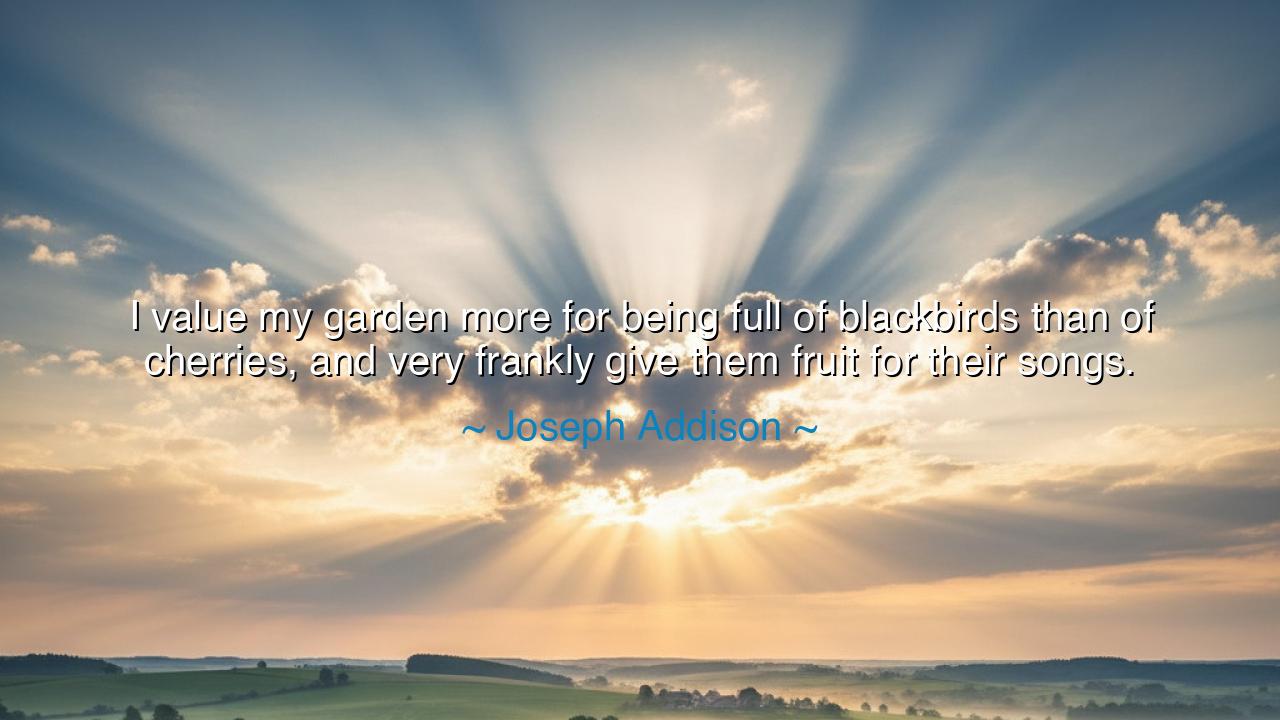
I value my garden more for being full of blackbirds than of
I value my garden more for being full of blackbirds than of cherries, and very frankly give them fruit for their songs.






The English essayist and philosopher Joseph Addison once wrote, “I value my garden more for being full of blackbirds than of cherries, and very frankly give them fruit for their songs.” At first glance, it seems a gentle reflection on nature’s harmony—a man willing to share his harvest with birds. But beneath this quiet image lies a profound teaching: true richness does not lie in possession, but in appreciation; not in hoarding what we have, but in giving and rejoicing in beauty. The cherries feed the body, but the blackbirds feed the soul. Addison reminds us that the heart finds its greatest nourishment not in what it owns, but in what it loves.
In this quote, the garden is more than a patch of earth; it is the soul’s dwelling place. The cherries represent material wealth—sweet, tangible, fleeting. The blackbirds are symbols of music, life, and the joy that cannot be purchased. Addison, a man who lived during the Enlightenment, understood that civilization often confuses value with utility. Yet here, he teaches a different arithmetic: that a melody sung freely by the wild is worth more than all the fruit one could store in a basket. The garden that welcomes song is alive; the one that guards its fruit too tightly becomes a prison of silence.
To give fruit for song is to embrace generosity, to trade what is perishable for what is eternal. The song of the blackbird costs nothing, yet enriches everything. The cherries, though delicious, will rot with time. In our own lives, how often do we cling to cherries—our comforts, possessions, vanities—while driving away the blackbirds that bring music, friendship, and inspiration? Addison’s words remind us that joy is not taken by force but given in openness. When we share freely, we are repaid not with things, but with beauty and connection.
A story from history echoes this truth. During the 19th century, John Muir, the great American naturalist, wandered through the wilderness of California, giving his life not to the accumulation of riches, but to the protection of nature’s song. He spent years sleeping under the open sky, protecting forests and mountains from destruction. When others saw timber and profit, Muir saw cathedrals of living light. Like Addison, he gave the world his “cherries”—his labor, his comfort, even his wealth—for the song of the wild. His writings awakened generations to see that the earth’s music is worth more than its material yield.
In a deeper sense, Addison’s quote is also about gratitude and perspective. The man who sees beauty in birdsong has learned to measure wealth not in possession, but in perception. The poor man who loves the sound of wind in the trees may be richer than the king who owns the orchard but hears nothing. The garden filled with blackbirds is a soul filled with wonder—alive to the poetry of life. This is the garden of the wise, who have learned that happiness is not to have all, but to cherish what one has.
There is a heroic humility in this wisdom. To give fruit to birds is to release control—to accept that some of what we have is meant for others, even those who give us nothing material in return. Yet in doing so, we partake in the divine rhythm of life, where giving and receiving are one and the same. The blackbird’s song becomes a hymn to balance, reminding us that life’s beauty thrives only in harmony. Those who demand everything for themselves destroy the song; those who share it, multiply it.
The lesson, therefore, is clear: treasure the song more than the fruit. Seek joy not in what you own, but in what you experience and share. Let your heart become a garden where generosity and wonder coexist. Feed the blackbirds of your life—those moments of art, friendship, and nature—with your time and kindness. In return, they will fill your days with melodies no coin can buy.
In the end, Addison’s truth endures: the greatest wealth is not in what we keep, but in what we delight to give away. The cherries will vanish with the season, but the song will echo long after the branches are bare. So, live as the wise gardener—open-handed, open-hearted, finding heaven not in harvests, but in harmony.






AAdministratorAdministrator
Welcome, honored guests. Please leave a comment, we will respond soon